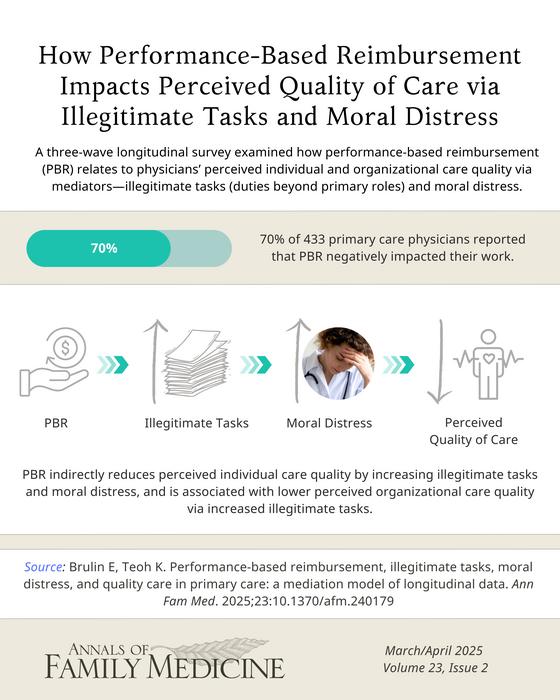
Performance-Based Reimbursement (PBR) continues to evoke considerable discourse within the medical community, largely due to its profound implications on healthcare delivery. A recent longitudinal study highlights the potential consequences of these reimbursement schemes on physicians’ administrative burden, moral distress, and ultimately, the perceived quality of care. This research, published in The Annals of Family Medicine, engages with the critical question of how PBR impacts not only individual practitioners but also the organizational framework of healthcare.
At the core of the PBR system, the intention is to incentivize healthcare providers towards delivering quality and outcomes rather than merely focusing on the quantity of services rendered. In theory, this shift proposes an elevated standard of patient care, aligning financial support with high-quality service. However, the reality as evidenced by the study suggests a dissonance between intention and outcomes, yielding an increased administrative workload that burdens physicians significantly. This phenomenon raises important concerns regarding the effectiveness of PBR in achieving its goals.
In the investigative framework of the study, researchers implemented a three-wave survey targeting primary care physicians from across Sweden. This methodological approach aimed to gather robust longitudinal data that reflect changes over time in the experiences of practitioners under a PBR system. By tracking responses across multiple durations, the study robustly addresses the evolving landscape of physician experiences, revealing distinct patterns associated with their perceptions of care quality.
The first wave of survey conducted gathered insights from over 6,000 physicians, focusing on their immediate responses to PBR. The findings were disconcerting; a notable 70.2% of respondents indicated that the shift towards a performance-based model negatively impacted their work. The richness of data collected, outlining the varying degrees of discontent, introduces a nuanced understanding of the struggle between the demands of PBR and the desire for quality patient care.
Building on these findings, the second wave of the survey explored the concept of illegitimate tasks using the Bern Illegitimate Tasks Scale. Illegitimate tasks are defined as those activities that fall outside the scope of a physician’s recognized responsibilities, effectively diluting their focus on patient care. Such burdens not only contribute to professional frustration but also exacerbate moral distress—a psychological response where individuals perceive a disconnect between their obligations and the realities of their working environment.
Moreover, the study unveiled a concerning correlation; increased illegitimate tasks and moral distress significantly correlated with lower perceived quality of individual patient care. This insight casts a stark light on the unintended consequences of PBR, where the drive for efficiency paradoxically leads to a degradation of care quality as physicians become mired in administrative complexities that detract from direct patient interactions.
The third wave of the survey shifted the focus toward organizational quality of care. Surprisingly, while PBR was again linked to an uptick in illegitimate work tasks, the resultant effects on organizational quality painted a more ambivalent picture. Although moral distress was hypothesized to influence organizational perceptions, the data suggested that it did not significantly impact perceived organizational quality of care. This presents an intriguing puzzle within the findings; understanding why individual moral distress does not translate into organizational implications warrants further investigation.
The crucial implications of this research extend beyond the confines of the study itself. The unveiled association between illegitimate tasks, moral distress, and perceived care quality poses questions about the sustainability and viability of PBR as a healthcare financing model. As the healthcare system adapts and evolves in response to socio-economic dynamics, an imperative emerges to prioritize physician well-being alongside patient outcomes.
Additionally, this research recasts the discourse around healthcare delivery by emphasizing the need for systemic reform that alleviates unnecessary burdens on healthcare providers. By identifying and addressing illegitimate tasks that impede effective care delivery, healthcare organizations can take strides toward reclaiming the focus on what truly matters—quality patient care and the welfare of the healthcare workforce.
In conclusion, the study speaks volumes about the complex relationship between financial incentives, administrative workload, and the quality of care across primary healthcare settings. As healthcare systems worldwide grapple with PBR and its ramifications, this research serves as a clarion call for stakeholders to rethink the fundamental frameworks governing healthcare compensation. The ultimate goal should be to ensure a healthcare environment where quality of care thrives, professional integrity is upheld, and physicians are equipped to perform their roles without the burden of irrelevant administrative tasks.
As we reflect on these findings, it becomes increasingly evident that the success of performance-based initiatives hinges on ongoing dialogue, research, and reform. The pursuit of improving quality care must remain central to all initiatives, ensuring that both patient and provider perspectives are equally valued and integrated into the healthcare delivery model.
Subject of Research: Performance-Based Reimbursement and its Impact on Primary Care Quality
Article Title: Performance-Based Reimbursement Increases Administrative Burden and Moral Distress, Lowers Perceived Quality of Care
News Publication Date: October 2023
Web References: https://doi.org/10.1370/afm.240179
References: The Annals of Family Medicine
Image Credits: Credit: American Academy of Family Physicians
Keywords: Performance-Based Reimbursement, Quality of Care, Healthcare Delivery, Administrative Burden, Moral Distress, Healthcare Providers, Longitudinal Study.
Tags: consequences of reimbursement schemeshealthcare delivery challengesimpact of PBR on physiciansincentives in healthcare systemslongitudinal study on PBRmoral distress in healthcareorganizational framework of healthcarePBR effectiveness concernsPerformance-Based Reimbursementphysician administrative burdenprimary care physician experiencesquality of patient care





